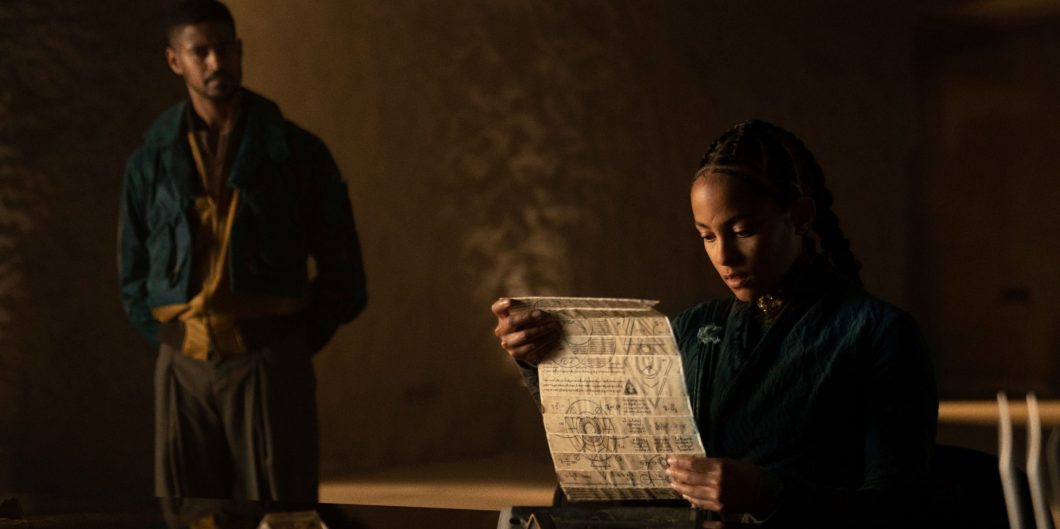From whence cometh our help?
Decadence and Progress in a New Foundation
The Apple TV series Foundation—already renewed for a second season—aims to become the defining story of Progress for this decade. This comes 80 years after Isaac Asimov first proposed his series of Foundation short stories to John W. Campbell, editor of Astounding Science Fiction. Those stories became a trilogy (you can read my essay on it), then eventually a larger storytelling universe involving dozens of volumes and several other writers. And now, it’s on screens.
Popular science fiction has gone from magazines that could barely pay writers to trillion-dollar corporations adapting the stories to the screen, making writers fortunes. Back in the 40s, authors like Hemingway and Faulkner were much better regarded than Asimov, some were paid handsomely, too. But nobody now seems interested in turning their stories into TV, much less with blockbuster budgets. Nor, in our times do we have such writers, so that you might wonder, is this the same America if taste has changed so much?
Science fiction proved best at predicting the way we would live and the things we’d be concerned with, given its interest in technology, and it now dominates storytelling. Still, even here, we have moved on to retelling mid-century stories. There’s almost no success in new ones, so talented screenwriters like David S. Goyer make their careers rewriting. His credits include movies based on comic books: Blade, the Dark Knight trilogy, Man of Steel, and now, Asimov’s Foundation.
Cloning as Decadence
Goyer starts with Asimov’s idea: The conflict between a crumbling Galactic Empire—massive, powerful, but decadent—and an upstart Foundation devoted to technological innovation giving humanity a chance to escape a new dark age. Goyer keeps the novel’s main characters, but his departures are bold: Hari Seldon, Asimov’s protagonist mathematician, designer of psycho-history, a predictive science of human affairs, is murdered early in the story. This happens as soon as the Foundation, with all its members, equipment, and spaceships, departs the imperial capital for the galactic outskirts. His plan to save humanity by scientific power focused in a Foundation, a radically new form of community, apparently must start with an act of bloodshed which is the story’s first major puzzle.
As with most prestigious productions nowadays, most characters are women and non-white. That’s somehow part of Progress, since Seldon was an old white man and the empire is run by whites. The more important innovation, however, is that the empire is run by clones of one especially enterprising and successful emperor. They rule in threes, a child who is educated, a man with the necessary energy, and an old man who gives counsel, thus assuring stability.
The empire is a technological despotism; its claims to rationality are limited, however, by bureaucracy and a tyrannical ruler. Authorities call people citizens, but everyone acts like slaves, and the empire is losing cohesion. Strife comes when the empire retaliates against terrorists who destroy a tower reaching into orbit, with imagery recalling 9/11. In later generations, further drama comes from religious revival of the notion of soul, undermining the clone emperors’ legitimacy.
The story moves through the generations, showing the personality of each emperor through the faces of the three actors portraying the three different ages, a device that provides the only surprising and pleasant cinematic innovation. An idea of immortality, almost of divinity comes out of this arrangement, one that demands obedience and awes mankind. However, the arrangement reveals the limits of individuality, of the will. If cloning is decadence, diversity is presented in the story, as it is presented in our politics, as the alternative, and therefore a source of Progress. But it’s not obvious what difference it could make in organization, since the story makes it clear that the emperor is a creature of the empire, not the other way around. Impersonality is a trap that very few in the Empire escape.
On Tradition and Founding
The alternative to the Empire’s splendid sterility is Seldon, mathematician supreme, but the way the story reveals his vision makes this dubious and confusing. Goyer has a fine idea, to use regular polyhedrons and game-like images of mathematics to interest the audience, but he cannot convey the science well, because he cares little for geometry and nothing for proofs. Worse, this is a galactic story, yet he shows no interest in astronomy.
This is not just a problem of how he tells his story, but also what he says. His Foundation supplies no vision of rationality. It’s a colony whose inner workings we understand only vaguely and without any interest—the story shows little and says less, nor do we care to find out more, since the protagonists are always acting out alone or at the outskirts of the community. Instead of rationality, everything turns on belief, and science and religion end up confused. Even the next best mathematician claims to not fully understand Seldon’s science. She is not even certain the math checks out.
This doubt about what we really know or can ever know is plausible, unlike Asimov’s fanaticism about the powers of mathematics, which are already obscure to most people, who ignore mathematics. Unfortunately, doubt leads to the paranoid storytelling of our times, to a fear that our political arrangements are evil, because they’re old, and yet that our moral revolt against them is itself doomed because we cannot liberate ourselves from the past. It’s hard to say what alternative to slavery we can actually attain. The story is all about unpredictability and so it discards linear storytelling, as do all sophisticated writers nowadays. We get flashbacks and forward flashes, but the dramatic sequence thus effected is unimpressive. As with any show nowadays, you apparently must watch 5-10 hours before you really understand what’s happening; and then adding intrigue, character disappearances, and episode cliffhangers further conceals the fundamental issue the plot is supposed to articulate: founding a community. The best one can say is that the Foundation is a typical liberal idea of multicultural progress, complicated or torn apart by a storyteller who cannot quite believe in that fairytale.
Goyer intends this confusing storytelling to contrast with the arrogance of the Foundation’s leaders, who are portrayed as pedantic academics who cannot see the world beyond their own scholarly concerns. They blink in face of war, they are invaded and cannot see it, and thus are guaranteed not to have any future, much less to save mankind from a dark age. They think Seldon’s thousand-year plan was the compiling of an encyclopedia; far from thinking knowledge is urgently needed, if there is to be a future, they simply presume there will be a future in which they can endlessly compile. These unworthy heirs are as arrogant as Seldon without any of his daring, a further argument against continuity or institutions. This becomes obvious when they discuss how to keep time (a matter of importance to Goyer the storyteller, to judge by his skipping back and forward in time): They reasonably debate what knowledge is essential to posterity, discarding a water clock’s precision for a sundial’s simplicity.
Mathematics teaches us what knowledge is, but it therefore also teaches us that we depend . . . on a cosmos that does not in turn depend on us.
Time as we experience it when we make decisions, remember things, or worry about the future means nothing to Seldon’s successors—they’re ghosts—they act as though they’re already dead and ignore their historic crisis. Worse, believing they know the future, they make the present much harder to deal with—which is how we experience the story. Without the clarity that authority brings, past, present, and future are vague and conflict. This is different from the imperial uniting of past, present, and future in certainty, but not obviously better. Goyer shows subtle thinking here, but it’s a nuisance to watch!
So, it turns out the encyclopedia no less than imperial cloning serves as a tradition keeping people chained to a past collapsing all around them. Even with enemies in their midst, such leaders are unable to make the serious decisions that follow from knowledge of our mortality and need for self-defense. How to preserve humanity when tradition is corrupted, decadent? Goyer gives us two female protagonists, mathematician Gaal Dornick and soldier Salvor Hardin, both rejected by their communities. The first is a scientist raised among anti-science fanatics and the second, a soldier and child of academics.
The Foundation is cast out from the empire and, accordingly, must be led by outcasts. As non-conformists, both have to rely on their own judgment, a necessity at the founding; together, they might add up to something, but since they are apart in the story, it’s much harder to say how they’re supposed to complement the Foundation. Nevertheless, they are both hardened by rejection and suffering, and used to acting independently. But it’s not clear what either needs from community or how they’d be able to deal with understandably skeptical communities. The bad acting doesn’t help, a characterization typical of the decadent shows of our times, so it’s impossible to see how they will measure up to Asimov’s geniuses who repeatedly save the Foundation by refounding, or modernizing it. Maybe this mediocrity is supposed to win over the audience, preparing for something more impressive next season.
Science and Conspiracy
However confusing the plot is, there are two clear ideas that work their way through the various scenes that concern these two young women. One has to do with the terrible suffering that is mostly absent from the Asimov novels, which take a cavalier attitude to catastrophe and misery even at planetary scale. These things are not only portrayed with a strange satisfaction, but this terrible background is supposed to supply the motives for important characters. The theme here is that human misery grows through injustice. Political change must overcome the apocalypse.
The early Foundation is invaded by barbarians, but instead of an elegant, brilliant diplomatic solution like the novel’s, we and the people of the Foundation learn about the terrible consequences of human pride in impressive battle scenes that put an end to the innocence of scientists. The barbarians take revenge on Seldon’s memory and on the empire, humbling the pride of arrogant people who rely on technology without really controlling it, but also jeopardizing the project of improving mankind. This is the real problem of the first season.
The other idea has to do with the transgressive character of mathematics, of reasoning without piety. Seldon’s young protégé, Dornick, was brought up by religious fanatics who reacted to their planet’s ecological catastrophe, which submerged their cities, with witch hunts and witch burnings. She grows up to see that the ecological problem isn’t gone and many of her people including her father prefer piety to scientific preparation. Meanwhile, she becomes a secret revolutionary, diving at night to retrieve scientific writings to teach herself, and eventually abandons that world.
The theme here is necessity, which puts limits to the human will. It can offer a solution to our problems if we don’t take them personally and don’t limit our view to human things. If mathematics somehow discloses the character of the cosmos, it has greater dignity than our opinions, which are limited to human affairs and aren’t certain, either. Mathematics teaches us what knowledge is, but it therefore also teaches us that we depend not only on each other, but also on a cosmos that does not in turn depend on us. Dornick says that the thing that scares her about black holes is not the darkness, but the inescapability of the gravitational pull. Black holes may be a metaphor for society.
Human nature is split between our properly human concerns and the cosmic situation in which we find ourselves, which is beyond our power to choose. The story suggests the sophisticated empire and the fanatics who live in reed shacks among whom Dornick grew up are identical from this point of view. They suffer a failure of nerve, an inability to look at things scientifically. As Seldon is to the empire, so is his protégé to her world. They are necessarily conspiratorial, because they experience the beginning of wisdom as impiety, violating the fundamental commands of their authorities. The girl tells her father they need to obey math; Seldon tells the emperor he needs to end cloning to save what can be saved of the empire; they are silenced, exiled. Their daring implies a standard by which they judge human affairs from the outside. This is going to lead to Utopia, to the foundation of a perfect regime, where geniuses are no longer harassed or murdered, where all reconcile themselves to the necessities the cosmos imposes on us.
I do not know how much of this promise Goyer can fulfill. I can only point you to this fact, that he helped Christopher Nolan write Man of Steel, which begins with a vision of the perfect regime, Krypton, focusing on the same twin issues of cloning leading to decadence and human willfulness leading to the nihilism that destroys wise men. Plato’s Republic, which teaches the ideas I’ve outlined in this review, is featured in that movie and I expect will play a major part in this ambitious portrayal of the problem of a philosopher who is also a ruler. Our storytelling at its best is guided by the ambition to learn from political philosophy and so should we be.



